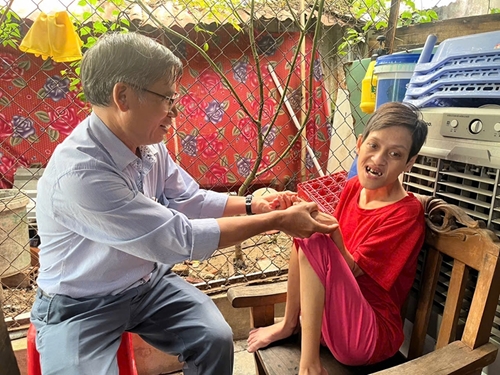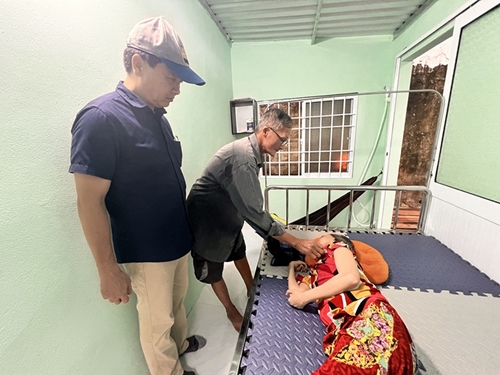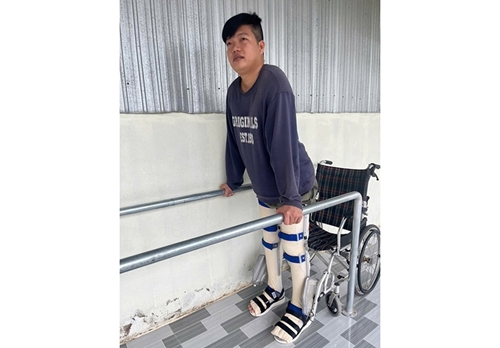A hope for the daughter
Visiting the house of Pham Thanh Son in Ward 8, Ca Mau city, one immediately heard the screams of his daughter, Pham Thai Hang, who suffers from congenital disabilities.
Since her birth 37 years ago, she has had to rely on her parents for food, bathing, and hygiene. Suffering from athetoid cerebral palsy, Hang has to crawl on all limbs to move around. With only a little awareness left, whenever she feels uncomfortable, she gets into mischief several times a week, making it very difficult for her family to take care of her.
    |
 |
|
At the invitation of the VNAH, Doctor Dao Thanh Hai, Deputy Director of Can Tho Orthopedic and Rehabilitation Hospital, gives Pham Thai Hang home examination services. |
Hang shares a room with her aunt, Pham Ngoc Tuyen, born in 1975 with birth defect of spastic quadriplegic cerebral palsy. Tuyen lies curled up on the bed all day with naive face and lifeless eyes.
In Ca Mau, many families like Son’s have members with disabilities without knowing the cause. In the past, the province was heavily impacted by U.S. military’s chemical warfare. Until now, it is impossible to fully calculate the extent of the damage since besides environmental destruction, many generations of Ca Mau people have been exposed to AO, leaving behind serious consequences. Though the cause of disabilities for two members of Son’s family has not been determined, the vague obsession with AO never ends.
Son’s family used to live on his income from his motorbike taxi job and the allowance for people with disabilities. Their living condition has been better thanks to the support from DIRECT project launched by the VNAH in the province.
    |
 |
|
Pham Thanh Son takes care of his sister Pham Ngoc Tuyen with birth defects. |
Tuyen now has a new bed which is easy to care for her hygiene. Hang has been under rehabilitation process, helping her move easier, avoiding falls and injuries. The bathroom is rebuilt with some equipment suitable for people with disabilities so that Hang could take care of herself in the room without any help.
Son hopes that with active support from rehab techs, his daughter could take care of herself like her aunt soon. “My family never dream of things that would make changes like they do now,” emotionally said Thai Thi Bich Van, Son's wife.
Helping persons with disabilities integrate into society
Son’s family is among hundreds of families in Ca Mau province benefiting from projects sponsored by the USAID and carried out by the VNAH with a focus on AO victims.
According to Phan Quoc Bao, the project coordinator in Ca Mau province, since its launch in March 2024, over 500 people with disabilities have received direct assistance from DIRECT project, including health check-ups, 6-9 month-long rehabilitation services, upgrade of toilets and living space, and livelihood provision, to name but a few.
    |
 |
|
Nguyen Du Lam practices standing with equipment and other support tools donated by the VNAH. |
Nguyen Du Lam, born in 1995 in Bien Bach Dong commune, Thoi Binh district was revived by the project. He was paralyzed when his wife gave birth. He shared that he feels reborn when he is able to move after receiving rehabilitation services at home. With the wheelchair, he now can help his wife with simple housework. The project also supports him with a livelihood package to raise ducks to earn extra income for family living expenses.
Phan Quoc Bao said that the importance and significance of DIRECT project is to support the development of rehabilitation resources for the locality, especially raising the awareness of rehabilitation. Rehabilitation is a multidisciplinary field that consists of medical, economic, social, rehabilitation engineering approaches, vocational guidance, and more, helping persons with disabilities reintegrate in society, improving their living standard, having the simplest life in their circumstances.
|
The project has supported 12 rehabilitation rooms for both adults and children, including autistic children in some medical facilities in Ca Mau provinces. The VNAH plans to improve capability for the provincial Association for Victims of AO/Dioxin.
The VNAH has carried out the ten-year DIRECT project since November 2015, bringing benefits to people with disabilities in Tay Ninh, Binh Phuoc, Dong Nai, Bac Lieu and Ca Mau provinces. As of September this year, 12,600 handicapped persons in five provinces received direct support from the project with over 85 percent of them showing improvement.
|
(to be continued)
Reported by My Hanh
Translated by Mai Huong